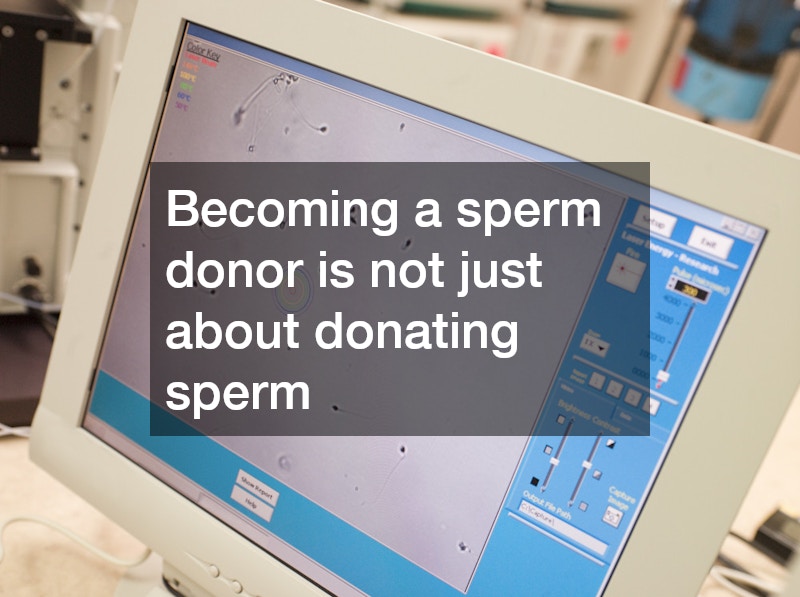Sperm donation is a process that involves a man donating his semen, which contains sperm, to help another person conceive a baby. This donation process can be beneficial to individuals and couples who are unable to conceive naturally. Many people turn to sperm donation due to medical conditions or genetic concerns that make natural conception challenging.
Becoming a sperm donor is not just about donating sperm; it involves understanding the emotions and responsibilities associated with potentially becoming a biological parent. Sperm donors often remain anonymous, yet they play a critical role in helping others start a family.
The emotional aspect of knowing one’s genetic material might be used to create life is a significant consideration.
The demand for sperm donors has risen over the years, partially due to the increasing acceptance of assisted reproductive technologies. Clinics often seek healthy donors to ensure the best chances of successful pregnancies. Legal and ethical considerations also guide sperm donation, ensuring donors and recipients navigate the process responsibly.
The Qualifications Needed to Become a Sperm Donor
Eligibility criteria for sperm donation are stringent, focusing on the potential donor’s health, genetics, and lifestyle. Typically, sperm banks require donors to be within a certain age range, commonly between 18 and 39 years old. Health screenings are vital, with donors undergoing extensive medical and genetic testing to assess their suitability.
Psychological evaluations are also part of the qualification process to ensure donors understand the implications of sperm donation. Lifestyle factors, like a non-smoking status and absence of drug use, are crucial as they affect sperm quality. Educational background may also be considered, as many recipients prefer donors with certain academic achievements.
The screening process serves to protect both the donor and the recipient, ensuring that the donation is safe and viable. Sperm donors are required to provide a detailed medical history and undergo blood tests to screen for infectious diseases. This rigorous assessment ensures that the donor meets all health and legal requirements, safeguarding the health of the potential offspring.
How the Sperm Donation Process Works
Once a donor qualifies, the actual process of sperm donation involves several steps, beginning with frequent visits to the donation facility. During these visits, donors provide sperm samples, usually obtained through masturbation, after abstaining from ejaculation for a specified period. The facility then assesses the sperm’s health and viability.
Donors can expect to visit the donation center regularly, as the process often involves multiple donations over time. Each sample is analyzed to confirm it meets quality standards before being frozen and stored. This procedure ensures the samples remain viable for future use in artificial insemination or in vitro fertilization.
Compensation is typically offered for each visit, recognizing the donor’s time and contribution. However, the primary motivation for many donors goes beyond financial considerations; it often includes the altruistic desire to help others build families. Additionally, the donation process is confidential, with donor identities protected unless they consent to disclosure.
Legal and Ethical Considerations in Sperm Donation
Legal frameworks around sperm donation vary by country and sometimes within regions, impacting donor anonymity and parental rights. In some places, donors may remain anonymous, while in others, children conceived through donation have the right to know their biological origins. As such, potential donors need to understand the legal landscape in their area.
Ethical considerations are also paramount, requiring donors to reflect on the implications of contributing their genetic material. Many donation centers emphasize informed consent, ensuring donors are aware of what sperm donation entails. Moreover, ethical guidelines help protect the rights and well-being of all parties involved.
There is ongoing debate about the transparency and long-term responsibilities of sperm donors, especially concerning the rights of children conceived through such donations. These considerations aim to balance the donor’s privacy with the child’s right to information. Therefore, comprehensive counseling and informed decision-making are critical components of the donation process.
The Rewards and Challenges of Being a Sperm Donor
Becoming a sperm donor brings both rewards and challenges, encompassing emotional, ethical, and practical aspects. The satisfaction of helping others achieve their dreams of parenthood is a significant motivator for many donors. This altruistic act can create a profound sense of fulfillment and purpose, knowing one has contributed to creating life.
However, potential challenges include navigating personal feelings about remaining an anonymous parent. Sperm donors must be comfortable with the fact that they may have biological children they may never meet. This requires a level of emotional maturity and understanding of the responsibilities associated with sperm donation.
Despite these challenges, the process of sperm donation is structured to support donors, with counseling often available to assist with emotional and ethical questions. Ultimately, being a sperm donor is about contributing to a cause larger than oneself, aiding those who face difficulties in building their families. This mix of altruism and the practical aspects of donation make it a unique and meaningful endeavor.



